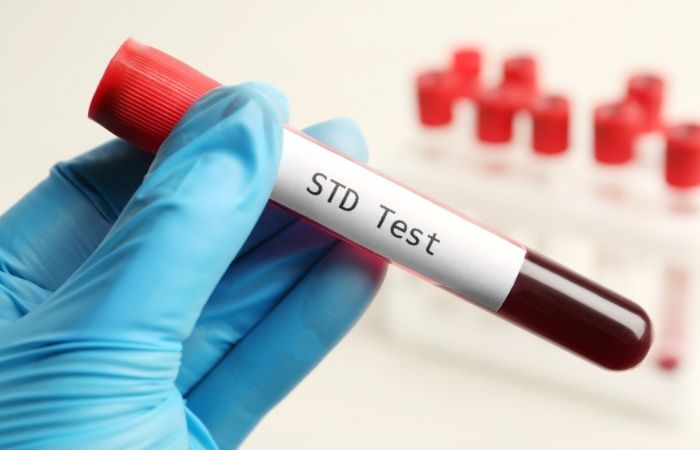Can You Have an STD With a Negative Test? What You Need to Know
The Silent Risks: Why Long-Term Relationships Still Need STD Testing
Many couples skip STD testing after they become monogamous, believing that their risk is low. But real-life situations show that STDs do not always act as predicted.
Some STDs Can Lie Dormant for Years
Some of the STDs, including chlamydia, herpes, and HPV, will remain in the body for months or years without symptoms. As many as 70% of women and 50% of men infected with chlamydia have no symptoms, according to the CDC, but they can transmit it to their partners regardless.
Case Study
Lisa and David had been married for seven years when Lisa received a positive test for HPV during a routine pap smear.
David was incensed, assuming infidelity. However, after they discussed this with their doctor, they learned that HPV can be latent for many years, and therefore Lisa could have contracted it from a previous relationship prior to when they got married.
Doctor's Insight
"Most individuals naively think that STDs come with symptoms automatically," says board-certified OBGYN Dr. Angela Carter. "In reality, infection with chlamydia or HPV may not be symptomatic at all for years. No way to absolutely know unless they get tested."

Past Relationships Can Still Affect Your Health
Just because you and your partner are with each other for years, however, there's still a prior history before the relationship. STDs don't disappear because somebody is in a new relationship—those stay with you until healed (if they have a treatment).
Personal Story
Mark had been together with his wife, Emily, for four years in a serious relationship. They had never gone to get tested because neither ever showed symptoms. When Emily got pregnant, she had a routine blood test which revealed she was infected with syphilis—a shock to the both of them. Mark had unwittingly picked it up from a lover years ago before he knew Emily and had no clue. Thankfully, with medication, both Emily and the baby were okay, but the shock would not have been needed if they had done routine testing.
Not All STDs Are Passed Through Cheating
Maybe the biggest myth of all is that an STD in a monogamous relationship should always mean cheating. But realistically, that doesn't always hold true.
- Non-sexual transmission: Some illnesses, like HSV-1 (oral herpes), can be caught by kissing, sharing beverages, or even touching skin.
- Medical errors: A false negative test, misdiagnosis, or defective screening in the past might have led to a failure to diagnose.
- Previous relationships: In other instances, the infections may have been present in the past before the current relationship and now only show themselves.
Doctor's Insight
"We need to take away the shame that STD testing suggests someone's been cheating," says Dr. James Nolan, an infectious disease specialist. "Testing is not about proving trust, but taking care of each other."
Order Now $49.00 $98.00 Check Your STD Status in Minutes
Test at Home with Remedium
Hepatitis B & Hepatitis C Test Kit




For all 2 tests
The Benefits of STD Testing in Long-Term Relationships
The majority of couples avoid STD testing since they believe that if they have trust in each other, they do not need it. Routine screening, however, has a lot of benefits aside from knowing your status—it's about health, communication, and peace of mind.
STD Testing Strengthens Trust, Not Destructs It
There are some people who fear that referring to STD testing in a relationship will create tension or imply mistrust. However, many couples discover that getting tested together really strengthens their relationship.
Personal Story
Maria and Jake were together for two years when Maria asked Jake to go get an STD check. Jake was defensive at first, thinking Maria was accusing him of cheating. Yet, after an honest conversation, he realized it wasn't a matter of trust—it was a matter of health and responsibility towards each other. They both got a test and, fortunately, the tests came back negative. It brought them closer together because they knew they'd done something positive for their relationship.
Doctor's Insight
"Referring to STD testing in a relationship is actually a sign of maturity and responsibility," says family physician Dr. Rachel Simmons. "It means that you care about each other's health and welfare."

Early Detection Prevents Long-Term Health Issues
Most STDs, if left untreated, can cause serious health complications. Regular testing ensures that infections are caught early before they lead to permanent damage.
Untreated STDs Can Cause
- Infertility (Chlamydia & Gonorrhea)
- Pelvic Inflammatory Disease (PID) (Chlamydia & Gonorrhea)
- Cancer (HPV-related cervical and throat cancers)
- Neurological damage & organ failure (Syphilis & HIV)
Case Study
Emma did not experience any symptoms, and therefore did not suspect that she had an STD. But during a routine checkup, it was discovered that she had chlamydia. Had she not been tested, the infection could have left her reproductive system permanently damaged and at risk of infertility.
STD Testing Erases the "What If" Anxiety
The majority of people in long-term relationships think they're STD-free and never even get tested. That constant "what if" puts unnecessary stress on you, though.
Testing provides you with certainty and reassurance. Rather than wondering if an old relationship introduced something unwanted, testing confirms your health status—allowing you to focus on your relationship without worry.
Doctor's Insight
"Of the biggest misconceptions that I see, is that people think they 'just know' they're STD-free," says sexual health expert Dr. Michael Tran. "Symptoms are not always cut and dried, and some STDs don't have symptoms for years. The only way to be absolutely sure is to get tested."
Order Now $189.00 $490.00 Check Your STD Status in Minutes
Test at Home with Remedium
10-in-1 STD Test Kit




For all 10 tests
Challenges and Myths About STD Testing in Committed Relationships
Despite the benefits, some couples avoid STD testing due to myths, embarrassment, and fear. Let's debunk the most common barriers and why they shouldn't deter you.
"We're Monogamous, So We Don't Need to Get Tested"
The biggest myth about STD testing is that only people who have multiple partners should get tested. Being monogamous doesn't mean you're safe—it just reduces the risk.
Reality Check
Certain infections (such as HPV, herpes, and HIV) might be carried symptom-free for years.
Even if both partners were devoid of prior partners before entering the relationship, there is still a risk of asymptomatic infections.
Syphilis, for example, might linger in the body for decades before serious symptoms develop.
Doctor's Insight
"Monogamy doesn't mean immunity," says Dr. Lisa Reynolds, an infectious disease specialist. "Even in monogamous relationships, past exposures can linger. STD testing is a smart choice, not a trust issue."

"STD Testing Means I Don't Trust My Partner"
Some people resist requesting that their partner be tested because they are afraid it will be insulting or raise eyebrows. In reality, though, testing is a matter of health, not trust.
Personal Story
When Ryan’s girlfriend, Megan, suggested they get tested, he was offended. “I’ve never cheated—why would she even ask me that?” But after they talked, he realized she wasn’t accusing him—she just wanted both of them to be safe. Once they got tested, Ryan admitted that knowing for sure gave him peace of mind.
Doctor’s Insight
"Getting an STD test is not any different from asking your partner to get a routine checkup," says urologist Dr. Henry Clarke. "It's preventing disease, not proving fidelity."
"STD Tests Are Only for People with Symptoms"
Most STDs are not symptomatic, so you may have one and not even be aware of it. Some infections don't manifest symptoms for months or years—by the time they do, complications have already set in.
STDs That Typically Have No Symptoms
- Chlamydia: 70% of women and 50% of men have no symptoms.
- Gonorrhea: Most cases are undiagnosed because symptoms are mild or misdiagnosed as a UTI.
- HPV: No symptoms in most instances, but some strains cause cancer.
Check Your STD Status in Minutes
Test at Home with RemediumChlamydia & Gonorrhea Test

 For Men & Women
For Men & Women Results in Minutes
Results in Minutes No Lab Needed
No Lab Needed Private & Discreet
Private & DiscreetOrder Now $49.00 $98.00
For all 2 tests
"STD Testing is Embarrassing or Stigmatized"
Many people avoid STD testing because they are embarrassed. But STD testing is an ordinary part of responsible healthcare—just like getting a blood test or a physical.
Did You Know?
Routine STD screening is offered by most primary care doctors as part of a yearly checkup.
In-home STD testing maintains testing private and easy, eliminating the embarrassment of going to a clinic.
Doctor's Insight
"If we normalize regular STD testing, we remove the stigma," notes Dr. Emily Foster, a sexual health expert. "STDs are infections, not sin. Testing is just good medicine."
Solutions: How to Mention STD Testing in a Relationship
Even when you know the benefits of STD testing, bringing it up with your partner is awkward. Here's how to approach it in a way that promotes understanding and strengthens your relationship.
Make It About Health, Not Trust
Instead of turning the conversation into a suspicion or accusation, present it as a shared responsibility for both your health.
Example Conversation Starter
"Hey, I was reading about how there are certain STDs that you can have without realizing it, and it hit me that we never got ourselves checked out. I think it'd be a great way to know we're healthy together—what do you think?"
Why This Works
- It removes accusation and makes it both of your's, not one of your's.
- It frames testing as normal health care, rather than an inquisition.
- It opens the door to an open conversation instead of a defensive reaction.

Suggest Getting Tested Together
Couples tend to not get tested because they fear judgment. Being willing to go together shows it's a team effort and reduces possible embarrassment.
Example Conversation Starter
"I noticed that a lot of couples go get tested together as a way of being there for one another. Want to go do it as a couple? It might be a positive experience for us."
Normalize Testing as Routine Health Care
One of the best ways to bring STD testing into your relationship is by making it feel as normal as a dental visit or a flu shot.
Example Conversation Starter
"I've heard that physicians recommend we get STD testing even if we're in a long-term relationship. We already go in for check-ups, so why not this one too?"
Why This Works
- It removes the suggestion that testing means there is something wrong.
- It shows that testing is merely a matter of being health-aware.
Check Your STD Status in Minutes
Test at Home with Remedium10-in-1 STD Test Kit

 For Women
For Women Results in Minutes
Results in Minutes No Lab Needed
No Lab Needed Private & Discreet
Private & DiscreetOrder Now $189.00 $490.00
For all 10 tests
Use a Personal Experience or News Story
If it comes on too strong to broach the topic, referencing a friend's story, reading a newspaper article, or observing an exchange online can be employed to lead into the topic.
Sample Conversation Starter
"I was reading this article where a woman found out she had an STD from years before she met her husband. She had no idea! It made me think—what if that happened to us? I’d rather just get tested and know for sure."
Offer a Private, At-Home Testing Option
For those who are not comfortable going to a clinic, home STD testing is a discreet and easy solution. Many providers let you order a kit, do the test in privacy, and get results online.
Example Icebreaker
"Did you know you can have at-home STD test kits? We don't even have to go to a clinic—we could just do it at home and check for peace of mind."
Advantages of Home Testing
- 100% confidential and private
- No doctor's appointment is required
- Simple to do as a couple

Professional Opinions: What Physicians Have to Say Regarding STD Testing in Long-Term Relationships
Physicians concur: Regular STD testing is a must, even in monogamous relationships.
Dr. Anna Patel, STD Specialist
"Most STDs are asymptomatic, so the only way you can be sure is to have a test. I always make it clear to my patients that testing isn't about trust—it's about health."
Dr. James Roberts, Infectious Disease Specialist
"Couples often assume their risk is low, but studies show many infections go years without being diagnosed. Testing puts the guesswork behind you."
FAQs
1.- Do I really need an STD test if I am in a monogamous relationship?
Yes. Some STDs can incubate for years, so either you or your partner may have been exposed before the relationship.
2.- If my partner requests that I get tested, does that mean they think I cheated?
No way. Testing is not an indicator of suspicion, but of health. It's no different than going to a routine health check-up.
3.- Can I have an STD without symptoms?
Yes. Herpes, HPV, and Chlamydia are just some examples of these types of infections which may not display symptoms for many years.
4.- How regularly should long-time couples get themselves tested for STDs?
At least yearly, or before one stops using a condom with someone new, advises physicians.
5.- Which of these STDs do we test for?
Routine STD screening tests usually include:
- Chlamydia & Gonorrhea
- HIV & Syphilis
- Herpes (HSV-1 & HSV-2)
- HPV (in women, through Pap smear)
6.- Where can we go and be tested?
STD testing is available at:
- Doctor's offices & clinics
- Planned Parenthood
- At-home STD test kits
7.- What if my partner won't be tested?
Speak with them openly about your concerns. If they still refuse to be tested, test yourself for your own peace of mind.
8.- How much does STD testing cost?
- Free or low-cost at public health clinics
- $50–$300 at private labs
- Around $100 for at-home test kits
9.- Does STD testing have insurance coverage?
Most health policies cover STD testing, especially if it's in a routine check-up.
10.- What do we do if the one of us is positive?
- Don't freak out—most STDs can be cured.
- Get the treatment a doctor recommends.
- No blaming—keep moving forward as a couple.
Check Your STD Status in Minutes
Test at Home with RemediumPapillomavirus (HPV) Test

 For Women
For Women Results in Minutes
Results in Minutes No Lab Needed
No Lab Needed Private & Discreet
Private & DiscreetOrder Now $33.99 $49.00
STD Testing is a Sign of a Healthy Relationship
Many people assume that getting an STD test in a long-term relationship implies doubt or distrust—but in reality, it’s a sign of responsibility, care, and commitment.
Key Takeaways
- STDs can be asymptomatic for years—testing is the only way to know for sure.
- Testing is about health, not trust—it’s a routine part of being responsible.
- Open conversations strengthen relationships—getting tested together brings peace of mind.
What You Can Do Today
- Schedule an STD test together at a nearby clinic
- Order a discreet at-home STD test for convenience
- Start the conversation with your partner with our tips
Taking control of your sexual health isn't only smart—it's necessary. Why take a chance when you can be certain and protect your relationship?
Sources
1.- Relationship Dynamics and Sexual Risk Reduction Strategies
2.- Navigating New Sexual Partnerships in Midlife: A Socioecological Perspective
3.- Monogamy as Public Policy for STD Prevention: In Theory and in Practice
4.- Long-Term Effects of Community-Based STI Screening and Mass Media Campaigns on Sexual Risk Behaviors
5.- Regular STI Testing Amongst Men Who Have Sex with Men and Use Social Media










